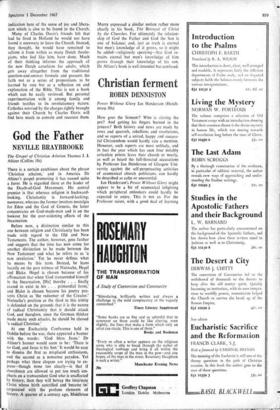God the Father
NEVILLE BRAYBROOKE
There is a certain catchiness about the phrase `Christian atheism,' and in America Dr Altizer's gospel promoting it has caused quite a furor. He is regarded there as the leader of the Death-of-God Movement. His central premise is that whereas religion is backward- looking, Christianity is forward-looking; moreover, whereas the former involves nostalgia for Eden and the God of Genesis, the latter concentrates on God-made-man and is on -the lookout for the ever-widening effects of the Incarnation.
Before now, a distinction similar to this one between religion and Christianity has been made with regard to the Old and New Testaments. The author, however, goes farther and suggests that the time has now come for another distinction to be made between the New Testament and what he refers to as 'a new revelation.' Yet he never defines what he means by this term. Instead, he leans heavily on the past witness of Nietzsche, Hegel and Blake. Hegel is chosen because• of his affirmation that when `God transcended himself in the Incarnation, [He] thereby . . . finally ceased to exist in his . . . primordial form,' and Blake is chosen because his poetry pre- sents Christ as 'the redeemer of the Creator.' Nietzsche's position as the third in this trinity is defended on the grounds that it is the nature of radical Christianity that it should attack God, and there,fore, since the German thinker made many such attacks, he should be classed `a radical Christian.'
At one Eucharistic Conference held in Dublin before the war, there appeared a banner with the words : 'God bless Jesus.' Dr Altizer's banner would seem to be: 'There is no God, and Jesus is his Son.' It would be easy to dismiss the first as misplaced enthusiasm, and the second as a nonsense paradox. Yet Perhaps what these slogans are trying to ex- press—though none too clearly—is that if churchmen are allowed to put too much em- phasis on a transcendent God who is unaffected by history, then they will betray the incarnate Christ whose birth sanctified and became
in-
corporated with the profane elements of history. A quarter of a century ago, Middleton
Murry expressed a similar notion rather more clearly in his book, The 'Betrayal of Christ by the Churches. For ultimately the relation- ship of God the Father and God the Son is one of balance; and, just as truth is eternal but men's knowledge of it grows, so it might be added—religiously speaking—that God re- mains eternal but men's knowledge of him
• grows through their knowledge of his son. Dr Altizer's book is well-intended but confused.


































 Previous page
Previous page